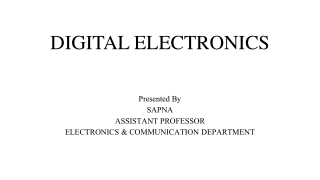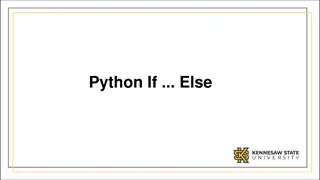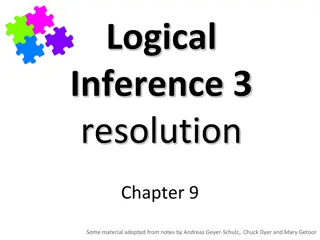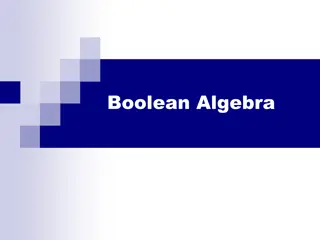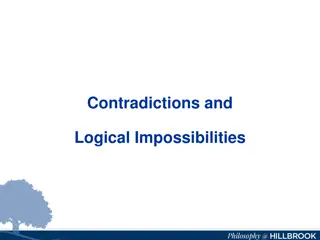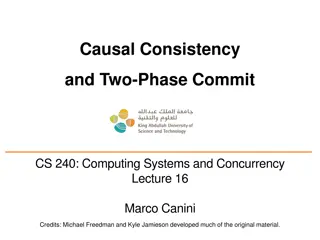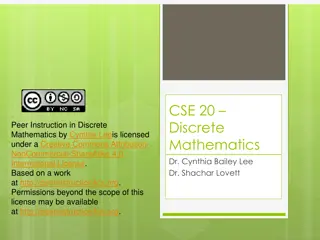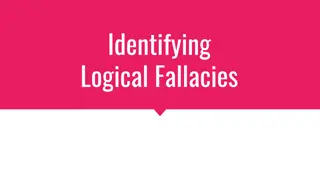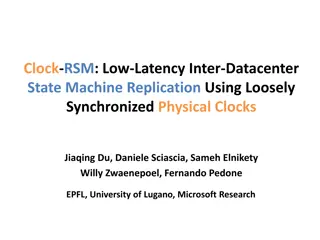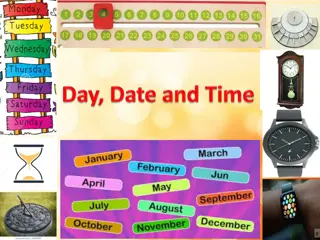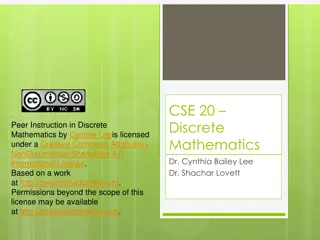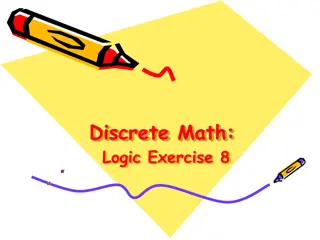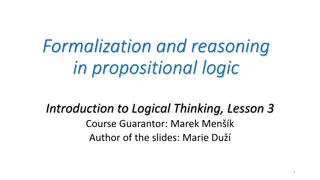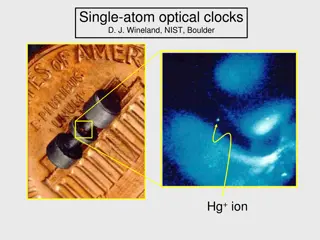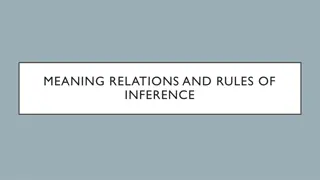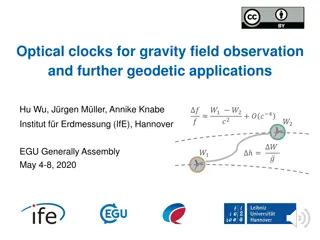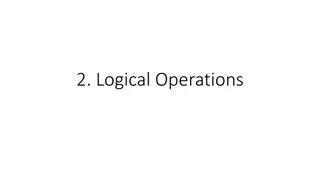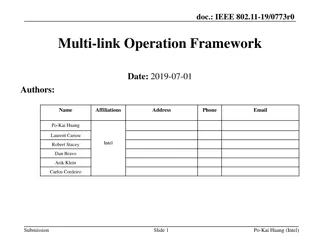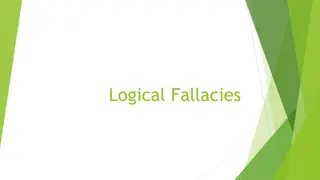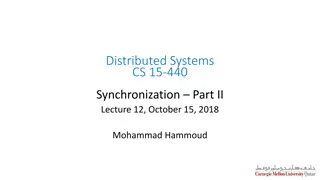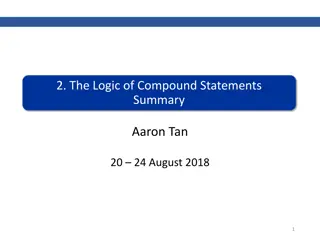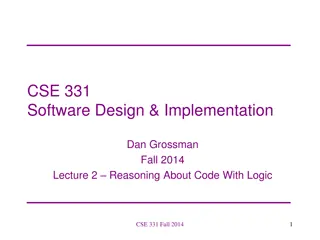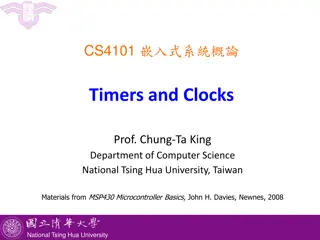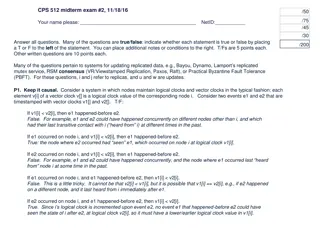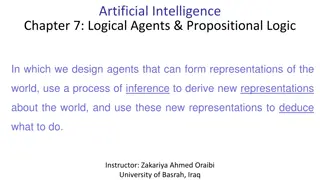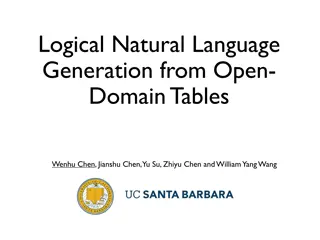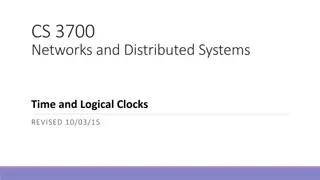DIGITAL ELECTRONICS
Introduction to digital electronics covering binary digits, logic levels, boolean algebra, logical operators (AND, OR, NOT), laws of boolean algebra, and operations like logical multiplication and addition. Learn about the fundamental concepts essential for understanding digital circuits and operati
0 views • 67 slides
Understanding Logical Form and Equivalence in Conditional Statements
Delve into the intricacies of logical form, equivalence, and compound statements in the realm of propositional logic. Explore valid and invalid arguments, conditional statements, and the logic of compound statements with puzzles to sharpen your logical reasoning skills. Unravel scenarios like determ
2 views • 81 slides
Understanding Python If...Else Statements
Python supports various logical conditions for IF statements and loops. It uses indentation to define code scope instead of curly brackets. The ELIF keyword allows for additional conditional checks, while the ELSE keyword provides a fallback for unmet conditions. Shorthand if statements and logical
8 views • 33 slides
Understanding Resolution in Logical Inference
Resolution is a crucial inference procedure in first-order logic, allowing for sound and complete reasoning in handling propositional logic, common normal forms for knowledge bases, resolution in first-order logic, proof trees, and refutation. Key concepts include deriving resolvents, detecting cont
1 views • 12 slides
Logical Expressions and Symbolism in Sentential Logic
Understanding sentential logic, logical expressions, and symbols through examples of logical reasoning and inference. Explore the concepts of logical OR, AND, negation, and the complexities of inclusive and exclusive logic in various scenarios.
1 views • 33 slides
Understanding Boolean Algebra and Logical Statements
Introduction to Boolean algebra, logical statements, and compound statements. Explore the concepts of Boolean variables, logical operators, writing conventions, equivalence in Boolean algebra, and truth tables. Learn how to analyze and evaluate logical expressions using truth tables.
1 views • 25 slides
Enhance Your Garden with Beautiful Adornments
Elevate your garden's charm with a variety of adornments like bird baths, sun clocks, fountains, garden seats, and ornamental posts. Learn how to choose comfortable and durable garden seats and decorative vases or tubs. Explore the beauty of garden vases, bird baths, and intricate sun clocks to crea
0 views • 18 slides
Exploring Contradictions and Logical Impossibilities
Explore a series of paradoxes and logical puzzles, ranging from being in two places at once to time travel conundrums. Discover the concept of contradictions and logical impossibilities through thought-provoking scenarios and riddles. Dive into the realm of impossibilities and challenge your underst
1 views • 6 slides
Enhancing Logical Reasoning in Decision Making Process
Federal Criterion #28 emphasizes the importance of stating logical reasons for decisions that align with findings of fact and conclusions of law. This criterion is key to ensuring fairness and accuracy in legal analysis. The scoring criteria, national appeals review results, and ways to improve scor
1 views • 8 slides
Understanding Boolean Algebra and Logical Statements
Boolean Algebra allows for formalizing logical reasoning using variables that can be either true or false. It involves logical statements, compound expressions, logical operators like AND, OR, NOT, writing conventions, equivalence, and truth tables to determine the truth values of statements. By und
0 views • 25 slides
Understanding Causal Consistency in Distributed Systems
This content covers the concept of causal consistency in computing systems, exploring consistency models such as Causal Linearizability and Eventual Sequential. It explains the importance of logical clocks like Lamport and vector clocks, and how they ensure order in distributed systems. The concept
0 views • 35 slides
Understanding Logical Connectives in Discrete Mathematics
Explore the world of propositional logic and truth tables in discrete mathematics through a peer-instruction approach. Learn about basic logical connectives, new connectives, complex formulas, operator precedence, and the nuances of implication (implies) with engaging examples. Delve into scenarios
0 views • 14 slides
Understanding Propositional Logic and Logical Operators
Learn about propositional logic, statements, logic operators, compound statements, exclusive-or, logical equivalence, and writing logical formulas for truth tables. Explore how to create compound statements for exclusive-or using different approaches and ensure logical equivalence. Enhance your know
0 views • 26 slides
Understanding Logical Relations in Programming Languages
Explore the concept of logical relations in programming languages, focusing on the relation between high-level and low-level programs. Learn about contextual equivalence, its benefits and limitations, and how logical relations offer a robust framework for defining program equivalence. Discover why l
0 views • 18 slides
Understanding Laws of Logic and Logical Reasoning
Laws of logic play a crucial role in reasoning and making deductions. This comprehensive guide explains the use of contrapositives, examples of conditional statements, and the significance of laws like the Law of Syllogism. Understanding these principles helps in effectively analyzing statements and
0 views • 8 slides
Introduction to Symbolic Logic: Understanding Logical Inferences
Logic is the study of reasoning methods to distinguish between correct and incorrect arguments. Symbolic Logic involves representing logic symbolically for easier understanding and manipulation. Logical inferences help in making decisions based on reasoning chains. The content discusses the use of l
1 views • 28 slides
Identifying Logical Fallacies in Sources: Presentation Assignment
Learn to identify logical fallacies in various sources by analyzing passages and applying the Logical Fallacy Referee tool. Work in pairs to select sources, identify fallacies, and present annotated examples to the class.
0 views • 7 slides
Low-Latency Inter-Datacenter State Machine Replication Using Clock-RSM
Clock-RSM introduces a low-latency approach to inter-datacenter state machine replication by utilizing loosely synchronized physical clocks. This method ensures strong consistency, fault tolerance, and fast failover in a geo-replication environment. By overlapping ordering and replication using phys
0 views • 29 slides
Fun with Calendars and Clocks
Explore the world of calendars and clocks with activities, questions, and fascinating facts. From learning the number of days in different months to understanding how the hands of a clock work, dive into the concepts of time and organization. Engage in interactive tasks like marking birthdays, natio
0 views • 25 slides
Peer Instruction in Discrete Mathematics
Explore the world of discrete mathematics with Dr. Cynthia Bailey Lee and Dr. Shachar Lovett through peer instruction. Dive into topics like step-by-step equivalence proofs and the equivalence of logical operators. Discover the different methods to show propositions are equivalent and delve into log
0 views • 14 slides
Propositions and Logical Connectives Exercise Solutions
In this exercise, propositions involving grizzly bears, hiking safety, and ripe berries are formulated using logical connectives. Solutions are provided for various scenarios including conjunctions, conditionals, biconditionals, and more. The explanations offer a structured approach to understanding
0 views • 6 slides
Introduction to Propositional Logic: Formalization and Reasoning
Understanding formalization in propositional logic involves replacing atomic propositions with propositional variables and natural language connectives with logical connectives. The process abstracts from internal proposition structure, reducing meaning to True or False. The language allows formaliz
0 views • 18 slides
The Logical Structure of Classical and Quantum Mechanics
The paper explores the common logical structure shared between classical and quantum mechanics, emphasizing the non-distributive lattice embedded in a distributive one. It discusses how all physical theories must adhere to this structure, incorporating topology, Heyting algebra, Boolean algebra, and
1 views • 36 slides
The Importance of Atomic Clocks in Modern Technology
Explore the significance of precise timekeeping provided by atomic clocks, the fundamentals of atomic clocks, the advancements in single-atom optical clocks by experts like D. J. Wineland from NIST Boulder, the role of atomic energy state superpositions, and the practical operation of atomic clocks.
0 views • 33 slides
Introduction to Logical Thinking in Computer Science at VSB - Technical University of Ostrava
This course introduces the concept of logical thinking in Computer Science at VSB - Technical University of Ostrava. Topics include valid arguments, deductive reasoning, and the science of correct reasoning. Requirements for passing the course include written tests and exams with specified grade ran
0 views • 18 slides
Understanding Meaning, Relations, and Rules of Inference in Logic
Exploring the concept of meaning, relations, and rules of inference in logic through the use of truth tables to evaluate logical formulas. Discover how tautologies and contradictions are identified, and how logical operators influence the truth values of propositions. Delve into examples that showca
0 views • 24 slides
Optical Clocks for Gravity Field Observation and Geodetic Applications
Optical clocks play a crucial role in observing gravity fields and have various geodetic applications. From comparing space-to-ground and space-to-space clocks to detecting mass loss in Greenland, these clocks offer high-frequency sampling data for precise measurements. They also aid in unifying hei
0 views • 10 slides
Understanding Logical Operations and Their Applications
Logical operators such as AND, OR, NOT, and XOR play a crucial role in programming and control systems. They are used to combine logical expressions and make decisions based on certain conditions. By utilizing truth tables, these operators help in solving problems efficiently. This article explores
0 views • 24 slides
IEEE 802.11-19/0773r0 Multi-link Operation Framework Summary
The document discusses the multi-link operation framework for IEEE 802.11-19/0773r0, focusing on load balancing and aggregation use cases. It introduces terminology related to multi-link logical entities and provides examples of multi-link AP and non-AP logical entities. The framework considers stee
0 views • 16 slides
Understanding Logical Fallacies: Common Types and Examples
Logical fallacies are errors in reasoning that can undermine the validity of arguments. This content covers various types of fallacies such as circular logic, either/or fallacy, oversimplification, overgeneralization, stereotyping, and ad hominem attacks. Examples and explanations are provided for e
0 views • 16 slides
Understanding Distributed System Synchronization and Logical Clocks
Continuing from the previous lecture on time synchronization, this session delved into logical clock synchronization, mutual exclusion, and election algorithms in distributed systems. Logical clocks, such as Lamport's Clock and Vector Clock, play a crucial role in defining the order of events withou
0 views • 33 slides
Understanding Compound Statements in Logic
The summary discusses the logic of compound statements, covering logical form, equivalence, tautologies, contradictions, conditional statements, valid and invalid arguments, and more. It explains the definitions of statements, negation, conjunction, disjunction, statement form, logical equivalence,
0 views • 12 slides
Logical Reasoning in Software Design and Implementation
Logical reasoning in software development involves determining the truth of facts as a program runs under specific assumptions. This process complements testing by allowing programmers to reason about classes of inputs/states and verify program correctness. Hoare Logic is introduced as a method for
0 views • 35 slides
Embedded Systems: Timers, Clocks, and Real-Time Control
Explore the role of timers and clocks in embedded systems, covering topics such as real-time monitoring, time-based control, and challenges with software delay loops. Learn about using hardware counters for time references and integrating timers as I/O devices in clock systems.
0 views • 48 slides
Causal Relationships in Replication Systems
In this piece, we explore various aspects of causal relationships within replication systems such as the significance of logical and vector clocks, updates propagation in systems like Bayou, and commitment to learning order in asynchronous replication systems. Through analyzing scenarios and stateme
0 views • 8 slides
Understanding Logical Agents and Propositional Logic in AI
Designing logical agents involves forming representations of the world, using inference for deriving new insights, and deducing actions based on these representations. Knowledge Base (KB) is a crucial component, comprising known facts and current percepts to infer hidden states. Propositional logic,
0 views • 23 slides
Introduction to Logical Thinking: Science of Correct Reasoning
Logic, the science of correct reasoning, explores ways to infer conclusions from assumptions and validate arguments. This course introduces logic as a tool for analyzing arguments, automating processes, and enhancing communication clarity. Through classic logic variants like propositional and predic
0 views • 30 slides
Reactive Clocks with Variability-Tracking Jitter in ICCD 2015
Explore the research on reactive clocks with variability-tracking jitter presented at ICCD 2015. The study delves into the cost of variability margins, timing analysis, clock variability comparison between PLL and reactive clocks, and adaptive frequency utilization. Understand the benefits and impli
0 views • 24 slides
Advancements in Logical Natural Language Generation from Open-Domain Tables
Cutting-edge research in logical natural language generation (NLG) is transforming the field by moving beyond traditional surface realization to generate summarized text, conclude trends, and apply logical and mathematical operations. By addressing limitations such as lack of logical inference, summ
0 views • 33 slides
Understanding Time and Clocks in Networks and Distributed Systems
Exploring the concept of time in a distributed system, this material delves into global time, practical implications, historical clocks, real-world time measurement, and GMT, UT1, and UTC. It discusses how relativity affects time perception and its importance in system design, covering topics such a
0 views • 31 slides
